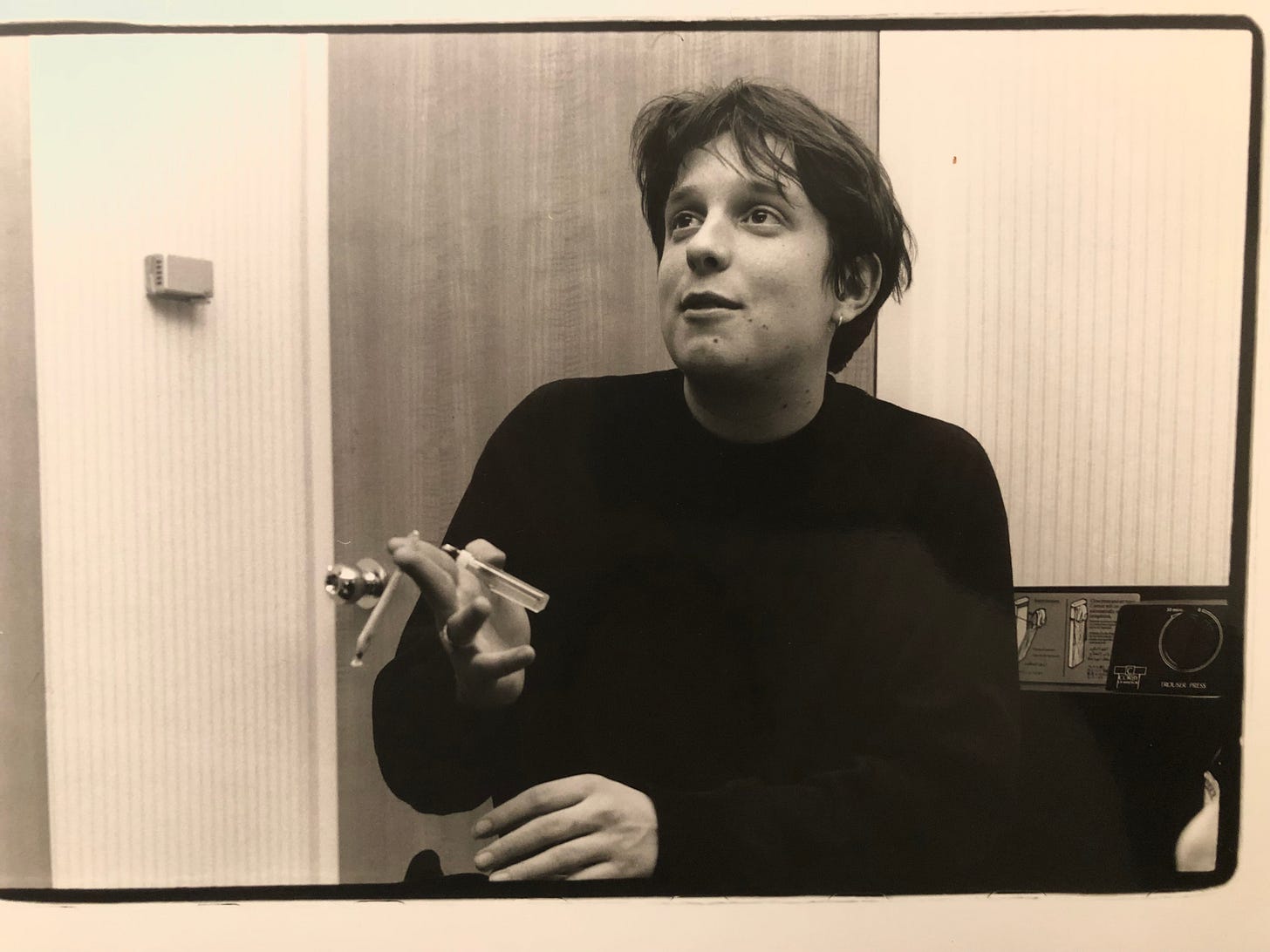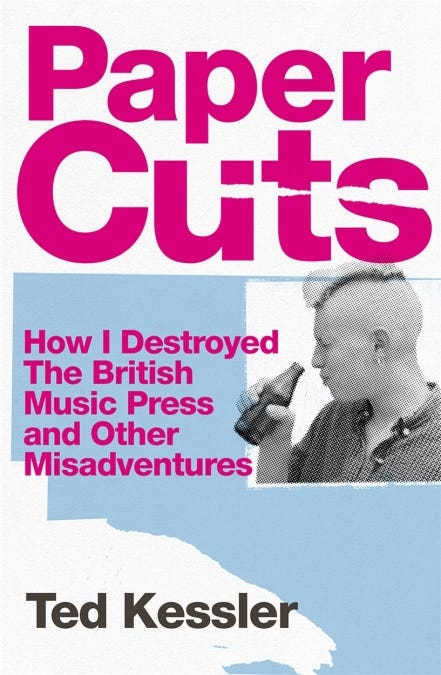Yes!
We made it to the end of Ted’s three day Paper Cuts residency. Phew. Back to normal on Friday with the good old Recommender Friday. You know where you are with Reccie Fridays. I love reading Niall’s introductions. He’s just the best.
Until then, though, it’s publication day for Paper Cuts. What’s that you say? You can’t make it to the shops today? Don’t worry about it, we’ve got you. We have this exclusive offer for New Cue readers of 30% off the RRP. Just click this link, add Paper Cuts to your basket and then write NEWCUE30 when prompted. Oh, you want a signed copy? Dedicated to your gran? OK, Ted’s doing an event on Wednesday 7 September at Rough Trade East, chatting with Felix White about the book and then doing signings. Tickets can be picked up here. He’s promised to take everyone to the pub afterwards.
Let’s give you a couple more reasons to buy Paper Cuts, though. Extracts from chapters about tender, awkward moments with Jeff Buckley and Radiohead follow…as well as appropriate playlists. I’ve been listening to the Karma Police Time playlist all day. So good! And in fact, I’ve also added the playlist for There’s No Limit because it’s kind of the same period and I really enjoy listening to it.
See you Friday. I hope you enjoy both today’s letter and the book.
Love you,
Ted (and Niall and Chris)
Chapter 11: What It’s Like
(Ted, 1994, on assignment for NME ‘searching for the spirit of rock and roll’)
What It’s Like excerpt:
Beyond Atlanta’s identikit American central business district in the back of a cab from our hotel, up through the verdant outer reaches of the city to the east, out into Little Five Point’s warren of alternative therapy centres, head shops, vintage stalls, international eateries and bars. Push the doors of the sprawling Point music venue and climb down a staircase to the basement kitchen onto a stool opposite sweet-faced, softly spoken, earnest-as-a-preteen Jeff Buckley.
‘So good to meet you. Thank you for coming all the way over to talk to me.’
Before leaving for the trip, there had been strict stipulations from Jeff Buckley’s US management that no mention could be made in person nor in print of Jeff’s father Tim Buckley, the similarly gifted singer-songwriter who had died at twenty-eight of a heroin overdose in 1975, when Jeff was eight. Tim had long been estranged from Jeff’s mother Mary Guibert at the time of his death, but his DNA was nevertheless stamped indelibly through his son for all to admire. They looked nearly identical, for one. They sounded staggeringly alike too, in a manner that seemed impossible for Jeff to avoid but that could not be replicated by any other artist, no matter how many have subsequently attempted it. They both wrote poetically romantic songs informed by their era’s cutting edge, played guitar in a fashion that embraced improvisation, and possessed voices of similarly unusual range and power.
How was I going to write this without at least mentioning his dad?
I said I wouldn’t, but then I did. I lied. I asked Jeff Buckley what he thought he’d taken from his father.
His eyes tightened. ‘I knew him for nine days.’
The sentence hung in the air for a moment, wrapping itself around my throat. Then Jeff Buckley picked up the thread, pulling tighter.
‘I met him for the first time when I was eight years old over Easter and he died two months later. He left my mother when I was six months old. So I never really knew him at all.’ A sad, light shake of the head. ‘We were born with the same parts, but when I sing it’s me. This is my own time and if people expect me to work the same things for them as he did, they’re going to be disappointed.’
I was neither smart nor sharp enough to reply that no, in fact, he was working exactly the same way that his father had done for listeners, and that that was OK. In no way did it diminish his work. It was just part of the story. He was his father’s son, but he was writing his own songs, living in his own time. I might have even mentioned that despite my best efforts and my father’s long absence from my life, I was a journalist and that my father was also a journalist. It was a coincidence, but also not at all. We are what we are, Popeye.
Instead, I awkwardly changed the subject. We spoke about the music that he did want to be associated with. We spoke about what influenced him.
‘The words come from here,’ he said, touching his top pocket. ‘From memories, from dreams, from people I’ve known. I’m always writing and reflecting on life. I want to suck it all in.’
‘The music,’ he continued, ‘comes from within and outside. Within is the big mystery of life, we’ve all got it. The outside bits are easier: the Beatles, Led Zeppelin, the Smiths – man, I’d fight for their honour, for the words of Morrissey and the music of Johnny – Edith Piaf, My Bloody Valentine, James Brown, Lush . . .’
‘Oh, I go out with Emma from Lush,’ I blurted. I couldn’t stop myself. It was idiotic.
He gave me a slightly embarrassed, you-don’t-say look, head cocked to one side.
‘Miki was at my gig in London.’
Please, I thought, we can’t talk about Lush in this interview.
‘John McEnroe was also there,’ I replied instead.
‘He came with Chrissie.’
‘Hynde? Yes, I saw you all talking afterwards. What do Jeff Buckley, Chrissie Hynde and John McEnroe chat about?’
‘That’s kind of private,’ he replied, wincing. He considered just how much could be discreetly revealed. ‘I told him he was the Johnny Rotten of tennis, the punk genius. He was why I watched tennis, there was art in what he did.’
A head popped around the door, puncturing the awkwardness. It was time for Jeff to warm up for the show. He shrugged apologetically and, as we stood in farewell, he opened his arms to hug me. We entered a clinch. Then Jeff Buckley stepped out through the kitchen and I left via the stairs.
There’s No Limit playlist…Lost in music, 1993
What It’s Like playlist…Lost in music, 1994
Chapter 14: Karma Police
Karma Police excerpt:
We arrived in the mid-morning of November 2nd at Huxleys, a hangar-like Berlin venue where in 1930 Adolf Hitler had addressed an audience that included his future first architect, Albert Speer. For the first six hours or so that we were there that was the most interesting thing that I learned.
As soon as the band heard we’d arrived, they locked themselves in their buses. Jonny Greenwood, emerging from his bus, had accidentally bumped into us as we pulled up in a cab. In his haste to escape, he’d let the door lock on him so he was forced to greet us and show us the way into the venue. He immediately took flight once he’d deposited us with the road crew who were setting up the rig.
It was very cold. Roger Sargent set up some lights in a doorway and waited to take photos. I smoked a lot of cigarettes. We watched the soundman rollerskating around the venue’s floor as roadies coughed into microphones. Though no doubt enjoying herself, Caffy left us to get on with it, joining the band on one of their nice, warm buses.
After all our reserves of banter and bitching had run dry, Roger and I fruitlessly sought some warmth in the band’s empty dressing room. Eventually, Caffy arrived with Colin Greenwood in tow ahead of their soundcheck. Colin was very tired after a long run of shows, and I too was dopey as I wasn’t used to waking at five a.m. to stand in the cold for six hours, but he was nevertheless friendly.
We settled into chairs behind a small round table next to their changing room and spoke for forty-five minutes about how the year had been for the band, about the future for them, about his favourite albums of the year. That kind of thing. It was all pretty jovial. A few minutes before wrapping up, as I started to run through any topics in my mind I might have forgotten to raise, I became distracted by a bright white light entering the room behind me. I turned my head to face it and became aware of a camera crew walking slowly around the perimeter of the room with one tall man next to the camera operator rolling his hands at me to keep talking.
‘Are they filming us?’ I asked Colin. ‘It’s a bit weird having them walk in on us like this.’
‘Not at all,’ he replied. ‘Life’s so short, especially the life of a band. It’s nice to have a record of it for when we’re old and grey.’
Grant Gee, a documentary maker who’d worked with U2, was on tour with Radiohead filming everything they did for a film that they hoped would show the dual realities of touring and promotion. Later, they’d film Roger taking his photos and me interviewing Ed O’Brien too. They were recording everything.
‘Just ignore us and carry on please,’ said the tall, posh man at the front of the crew who I assumed was Gee.
The interview was pretty much over by this point, but we battled on for a few more minutes. I dredged up a question about the band’s schedule and Colin drifted off into a complaint about interviews and being interviewed, that ended with him apologising and pulling his hat over his eyes. I didn’t really know why he was apologising and told him so. He was the bassist. In normal circumstances he wouldn’t need to do quite as much heavy lifting in an NME cover story. It was all fine. I knew I could make it work. Don’t worry.
Grant Gee and his gang kept the cameras rolling. I shook my box of matches. Come on, please. Let’s stop filming.
Karma Police playlist…Lost in Music, 1995 through 1997.
And that is the end of our run of Paper Cut extracts. If you want to read the whole thing, there’s another 100,000 words available here, now.





